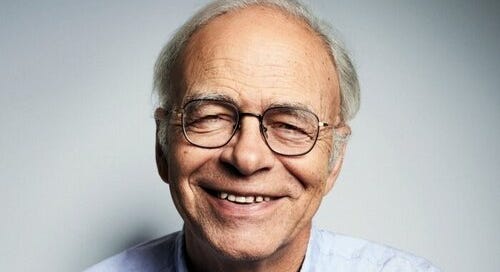I recently debated Peter Singer, probably the world’s most famous philosopher, on “Do the rich pay their fair share?” No video is available, but here are my top thoughts on the exchange:
Even at 76, Singer is very sharp, curious, and reasonable. Talking to him was a great pleasure.
Singer seems to have completely abandoned the extreme view that we are morally obliged to give away all our surplus resources to the poor. Instead, he just pushed for a rough charity target of 10% of total income.
Singer reaffirmed his devotion to utilitarianism, but never explained why he drastically changed his mind about the morally obligatory level of donation.
I suspect the reason is that publicly defending the actual implications of utilitarianism alienates listeners, so a true utilitarian is morally obliged to conceal what true utilitarianism requires. In other words, you get better utilitarian results by misstating the implications of utilitarianism. Since utilitarianism puts no direct value on honesty, this is strangely not hypocritical.
Singer was quite open to my claim that instead of denouncing uncharitable people as reprobates, we should instead praise philanthropists as “heroes.” Yet again, it was unclear if he just saw this as a potentially Noble Lie. After all, a utilitarian would happily call a philanthropist a hero if the label induced greater charitable giving, even if in fact he is merely doing his moral duty (or far less than his moral duty).
Singer was also quite open to my claim that governments cause a lot of the poverty that utilitarians want to fix with charitable giving. His main objection to open borders is just that it’s politically impossible, though he’s also worried that even modest immigration helps right-wing populists gain power. Which in turn impedes policies to mitigate global warming.
This makes me want to see Singer debate Alex Epstein, author of The Moral Case for Fossil Fuels and the new Fossil Future! At minimum, Singer clearly needs to stop being lukewarm about nuclear power.
When I pointed out that many of the most anti-immigration countries actually take very few immigrants, he was unfazed. I should have pushed harder on the low correlation between actual political problems and perceived political problems. We know that perceived inequality is barely related to actual inequality. I suspect, similarly, that perceived immigration is barely related to actual immigration. Upshot: Since critics will “see” massive immigration regardless of the facts, you might as well push for as much immigration as possible.
Singer does seem to have zero-sum instincts, but he was surprisingly open to my general claims about ubiquitous negative-sum economic policies. It was easy to get him to start talking about the evils of demagogues and demagoguery.
I used to think of Singer as a radical leftist first, and a contrarian second. Since then, he’s changed and I’ve learned. Now I think of him as primarily the intellectual godfather of Effective Altruism, a movement for which I have great admiration. As I told students at the University of Chicago last year, “Effective Altruism is what Social Justice ought to be.” (In slogan form, “EA is what SJ ought to be.”) Though I often disagree with specific EA views, their hearts and their brains are in the right place. And the same goes for Peter Singer himself.
Thanks to the great Jonah Franks for organizing this entire debate series. Well-done, Jonah.




From a utilititarian viewpoint it doesn't make that much sense to think about the "obligatory" level of donation (or doing good in general). You could say that there's an obligation to do the thing that maximises happiness. Or you could say that there's an obligation to not maximise suffering. Or you could draw the line anywhere in between those two extremes. But where the line for what's considered obligatory is just an arbitrary deccision and not a moral fact according to utilitarianism. It's looking at something which is clearly continous as binary.
1) Nobody really knows the correct level of charitable giving to maximize "utility".
2) Charitable giving is likely subject to diminishing returns, like everything else.
3) The level and nature of charitable giving is you do is probably not going to be optimized, even if you try your best. This applies to EA people too.
4) It's probably easier and more efficient for society to have some rule of thumb that most people can follow as to their level of charitable giving. It reduces investment of each individual into figuring out what it should be, and it limits competitive social signaling spirals.
5) "Tithe 10% of your income to good works" has a really long tradition that appears to have worked for a long time. If you believe in diminishing returns of charity, 10% seems to pass the eyeball test to me as well.
7) The same logic above applies to most things, including immigration.